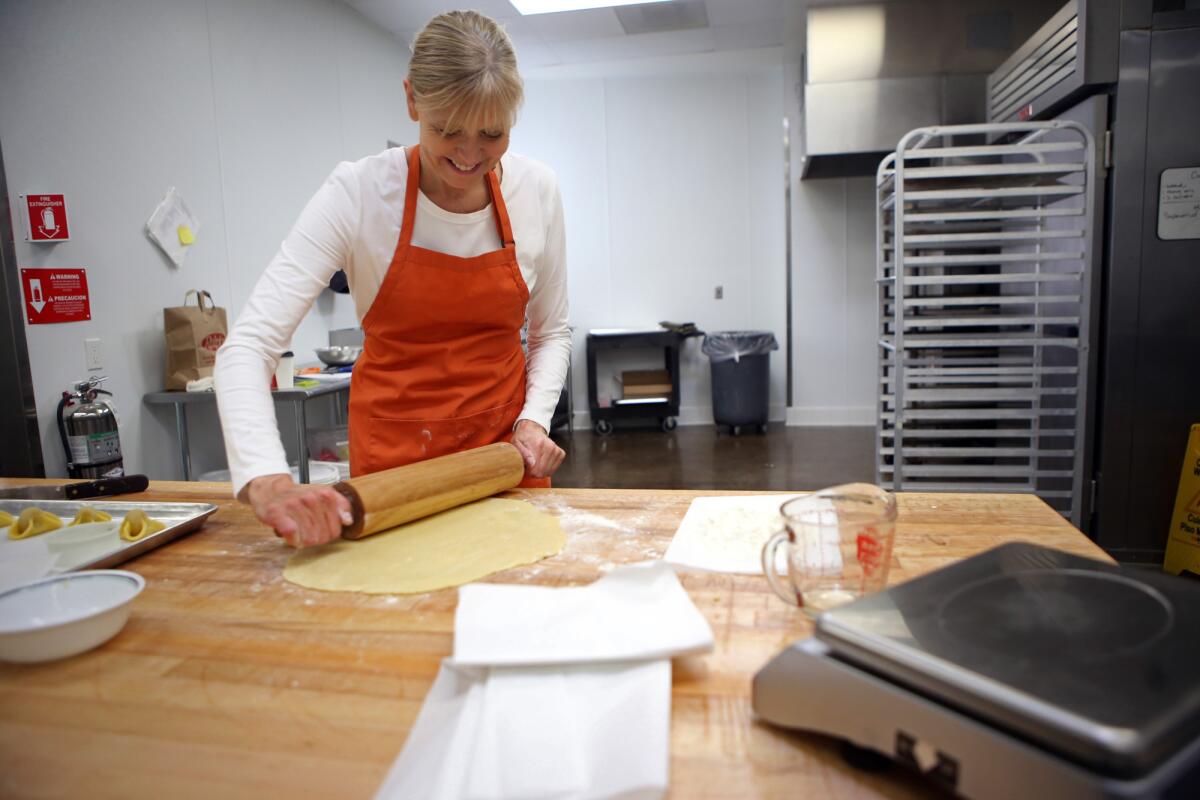Inside the marzipan world of L.A.’s Copenhagen Pastry

Baker Karen Hansen, owner of Copenhagen Pastry, rolls out the dough to make Napoleon hat cookies at her bakery in Pasadena on Dec. 7.
- Share via
“I remember my first Christmas gift. I was 4 years old,” says Karen Hansen, owner of Copenhagen Pastry, the Danish bakery that now has two storefronts in the Los Angeles area. “It was a marzipan fruit.” Hansen, now 57, is smiling as she tells the story, powdered sugar on her hands, the aroma of baking Linzer tarts saturating the air in her year-old Pasadena shop — Hansen’s first place opened three years ago in Culver City — that functions for many people in this town as a kind of marzipan dealership.
At Copenhagen Pastry, Hansen figures, about 80% of the traditional Danish pastries and cookies and cakes she sells contain marzipan, or sugared almond paste, in some form or another. There are the kringles and kranse cakes and Napoleon hats — cookies folded around balls of marzipan and dipped in chocolate that are meant to resemble the French general’s black felt hat, a piece of actual headgear that sold last year at auction for $2.4 million. (Why Napoleon’s hat? Because Denmark and France were allies in the early 19th century. And if you could bake pastries in the shape of a tiny general’s hat, you probably would too.)
SIGN UP for the free In the Kitchen newsletter >>
Hansen is from Næstved, a town about an hour south of Copenhagen in Denmark, and she grew up baking with her family. Her mother made her own marzipan, stretching the paste with additional powdered sugar to make it go farther, as the almonds were expensive. They still are, in drought-beset California, which gives baking with marzipan a celebratory feel, the blend of tradition and cupboard extravagance aligning with the Christmas decorations in the front of the bakery and the rows of little molded marzipan pigs that Hansen and her bakers have made for the holiday.
If you didn’t grow up on it, marzipan is highly addictive stuff, often loaded into almond croissants or bear claws, secreted inside pastries and cookies, formed into dangerously cute little candies that have been molded into the shapes of fruits or animals. (Marzipan and almond paste are more or less the same thing, although marzipan often is made with significantly more sugar, depending on its manufacturer and purpose.)
And although you can find marzipan in pastries and desserts of many cultures, Northern European countries have a particular fixation with it. Odense marzipan, which is what most people find in grocery stores, has been made in the Danish town of the same name, Hans Christian Andersen’s hometown, since 1909. And if you’ve ever been to the northern German city of Lübeck, you might be forgiven for thinking it’s an enormous pastry shop, rather than a Hanseatic port town, because there are so many shops selling the stuff.
Hansen’s role as marzipan supplier was a circuitous one. It was her brother Peter who first became a baker, although “it was our dream to open a bakery over here” in the country to which Hansen immigrated in 1981. When he was a teenager, Peter worked at night in a bakery in Næstved; then he opened two bakeries in Denmark and, later, baked in Iceland and the Faroe Islands. Hansen, on the other hand, moved to Los Angeles, worked for a maid service (“When you’re Danish, you do that”) and then ran a marketing business for photographers for 20 years. And, finally, opened a bakery — although without her brother, who died in his early 30s.
“We wanted to have a very traditional pastry shop,” says Hansen, who credits her success to her customers’ connection to the culture — she just sent out a huge pastry order to a Danish church — and to a newfound interest in Danish cuisine. “Noma has definitely raised awareness,” she says of René Redzepi’s celebrated Copenhagen restaurant. People come in to Hansen’s shop, whether for the first time or the hundredth, “and then we just fill them full of samples.” For marzipan junkies, that’s mostly all it takes.
More to Read
Eat your way across L.A.
Get our weekly Tasting Notes newsletter for reviews, news and more.
You may occasionally receive promotional content from the Los Angeles Times.











